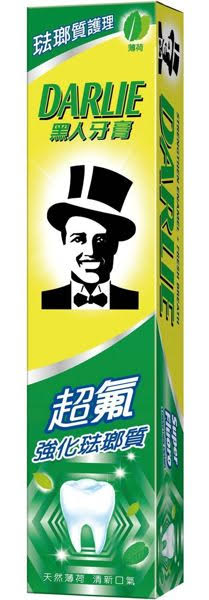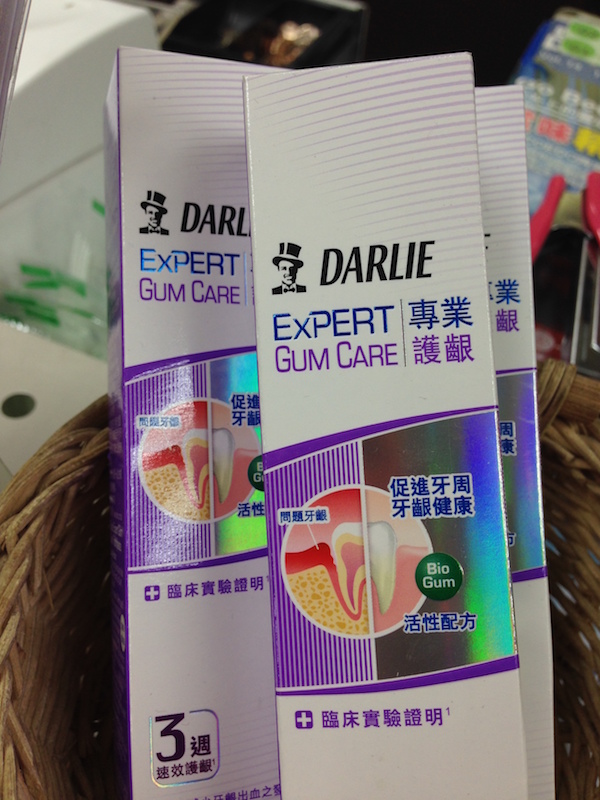Darlie toothpaste
« previous post | next post »
When I was teaching in Taiwan in 1970-72, there was a well-known brand of toothpaste called Hēirén yágāo 黑人牙膏 ("Darkie Tooth Paste"). Not only was the name strange, the packaging featured an image of what looked for all the world like Al Jolson in one of his blackface performances. Naturally, I was scandalized by this, but when I asked my Taiwanese friends about it, they didn't see anything wrong with the name and said that it made sense from an advertising standpoint because the man had gleaming white teeth and the blackness of his skin made them seem all the brighter.
Many years later, when I went back to Taiwan after a long hiatus when I frequented the mainland and elsewhere, I was surprised to see that the English name of the toothpaste had been changed to Darlie. Apparently, the change took place after Colgate-Palmolive acquired the brand from the original owner, Hawley & Hazel, in 1985. (Source)
The new English name sounds silly and doesn't really mean anything, yet the Chinese name remains Hēirén yágāo 黑人牙膏 ("Black Person Tooth Paste"), because ostensibly it is not considered offensive in East Asia.
The picture of the man in a top hat on the package that used to be clearly black has now become racially nondescript.
Here's an account of what happened from mothership, a Singapore publication, with photographs of the packaging at various stages in the evolution of the product:
"How Darkie became Darlie, and why it still keeps its Chinese name which basically means Darkie: One letter change", by (December 16, 2016).
Some recent Darlie products other than their toothpaste dispense with the offensive Chinese name:
But the Chinese name of the toothpaste remains the same:

Courtesy of Melvin Lee
And here's a television advertisement from last year:
Incidentally, there is also a Báirén yágāo 白人牙膏 ("Whitemen Toothpaste", sometimes "Whiteman Toothpaste").
If you look around on Google Images, you can also find a broad assortment of other Chinese toothpaste brands with bizarre names, such as:
Cteeth (in a package that clearly mimics that of Colgate toothpaste)
Cract, Crust, Crene (all three mimicking Crest toothpaste packaging)
Cleast (knock-off of Darlie)
Chinky (in a league by itself)
The Chinese toothpaste industry is full of energy, if not creativity.
[Thanks to Grace Wu and Tim Clifford]

Rube said,
July 5, 2018 @ 3:23 pm
I remember when the change took place in the Eighties. Arsenio Hall held up a tube of the new package and said that the label meant "Don't worry y'all, it's still 'Darkie' ", which apparently was actually pretty close to the truth.
Rumiko Sode said,
July 5, 2018 @ 3:25 pm
"[…] because ostensibly it is not considered offensive in East Asia." The writer generalizes in one split second from this observation about the Taiwanese market and the rest of "East Asia". That is inaccurate and far from the truth. I cannot speak for the other regions and nations but in Japan, where I am from, no serious product named "black person" ('kokujin') something would be "Okay".
David Morris said,
July 5, 2018 @ 3:39 pm
And Chinky toothpaste is not considered racist?
Xiaoma said,
July 5, 2018 @ 4:01 pm
Wow, coincidentally I recently made a video for my Chinese audience about this very topic — we asked a bunch of black people in Times Square what they thought of 黑人牙膏. Video here: https://www.youtube.com/watch?v=rtPFufXyX1Q. Reactions from the people we asked were mixed — some offended, some were cool with it — but what was particularly interesting was my audience's reaction. As you can tell from the like / dislike ratio and the comments tons of people were extremely offended that I would make this video, almost as though I were putting China in a bad light by implying to people China is racist towards blacks. (And the video did not get past the censors in China either btw.) The reaction took me aback but I learned a lot from the experience.
Doug said,
July 5, 2018 @ 5:23 pm
Oddly enough, it seems that "Red Man" Chewing Tobacco is still around in the USA.
julie lee said,
July 5, 2018 @ 6:45 pm
This is the funniest Language Log post from Professor Mair that I have ever read. I laughed very hard. The comment from Arsenio Hall ( @ Rube said) is also very funny.
Jonathan Smith said,
July 5, 2018 @ 7:37 pm
"Don't worry y'all, it's still 'Darkie' "
It seems that is just what the 1990 advertisement said, Cantonese speakers can confirm
https://www.youtube.com/watch?v=EM9C2esCG24
Rafael said,
July 5, 2018 @ 8:38 pm
Oh, so that's why! I found a lot of these in Thailand, where I lived some years. Also that BLACK MAN thing — a brand for cleaning products ( https://www.bangkokpost.com/lifestyle/family-and-health/295230/brand-names-still-stuck-in-the-dark-age )
Ricardo said,
July 5, 2018 @ 9:59 pm
@ Rumiko Sode
While the writer did generalize, one can almost understand why if one considers that 'blackface' performances are still a feature of Japanese and Korean television. There is also the fact that very widely in East Asia the cosmetic industry still promotes products with the implicit or explicit message that they will whiten the skin.
"black person" something may not be "Okay". But are you sure that the attitudes that lead to such products are entirely gone?
Jeff said,
July 6, 2018 @ 1:07 am
@ Rumiko Sode
Perhaps not "黒人", but Japan certainly hasn't had any problem with products like ブラックメロンパン (Black Melon Bread) (http://www.debito.org/?p=8045), and doesn't shy away from caricatures of other races in advertising.
Andreas Johansson said,
July 6, 2018 @ 3:40 am
Ricardo wrote:
There is also the fact that very widely in East Asia the cosmetic industry still promotes products with the implicit or explicit message that they will whiten the skin.
Ads for skin-lightening creams and the like were very common in Congo-Kinshasa when I was there last year. I don't think there's anything necessarily more racial about them than about fake sun tan products for light-skinned people.
Ricardo said,
July 6, 2018 @ 5:03 am
@Andreas Johansson
Arguments about the significance of products for lightening the skin (lactation) in Asia and elsewhere have raged for several years. Some people have argued that the fetishization of white skin has its basis in class and a wish to distinguish oneself from those who labor in the fields under the sun. I am aware of the arguments and do not presume to judge. You are thus correct to say 'I don't think there's anything necessarily more racial about them', especially if one emphasises the word 'necessarily'.
However, many of these skin-lightening products are harmful (if not toxic) and thus cannot be compared to fake sun tan products. I would therefore suggest that the mental and social attitudes (whether they have their basis is in race, class or something else) that makes one reach for such a desperate remedy are unlikely to be healthy.
richardelguru said,
July 6, 2018 @ 6:09 am
The Camp Coffee label has a somewhat similar evolution. According to Wikipedia:
"The original label, by William Victor Wrigglesworth, depicted a Sikh servant waiting on a kilted Scots soldier. A later version of the label, introduced in the mid-20th century, removed the tray from the picture, and was seen as an attempt to avoid the connotation that the Sikh was a servant, although he was still shown waiting at attention while the Scottish soldier sipped his coffee. The current version, introduced in 2006, depicts the Sikh as a soldier, now sitting beside his former boss, and with a cup and saucer of his own."
Bathrobe said,
July 6, 2018 @ 6:52 am
There is a lack of symmetry between 黑人 and Darkie, in that, while 黑人 is neutral in Chinese, 'Darkie' is a discriminatory term in English. This is not to defend a toothpaste that calls itself 'black man', but there was undoubtedly greater urgency about getting rid of 'Darkie' than there was about getting rid of 黑人.
번하드 said,
July 6, 2018 @ 9:14 am
I'm reminded of the coffee beans my wife and I switched to after our earlier favorite disappeared because climate-change induced parasite insect migration ate into profits.
We really like the taste of these beans, despite the really weird and anachronistic picture on the bag. Try image search for "Lucaffè Mamma Lucia"
David L said,
July 6, 2018 @ 11:54 am
@richardelguru: You surely remember Robertson's jams and marmalades and their infamous golliwogs. At one time I had the whole set of golliwog jazz musician manikins, which of course were not racist at all in any way, shape or form. Consulting Wikipedia I was surprised to find that the gollies were only discontinued in 2002, but absolutely definitely not for reasons of political correctness: https://en.wikipedia.org/wiki/Robertson%27s#Discontinuation_of_Golly
Ricardo said,
July 6, 2018 @ 9:05 pm
@David L
The statement from Robertson's that 'We are not bowing to political correctness' strikes me as ridiculous. Just a half-second of reflection would tell the company why 'kids no longer necessarily knew about him [Golly]'.
Rodger C said,
July 7, 2018 @ 8:56 am
@Ricardo: Well then, they're not bowing to PC, they're bowing to the result of PC, or as some call it, common courtesy.
Nikw211 said,
July 8, 2018 @ 6:19 am
For anyone interested in this story, see the detailed breakdown of it by late Professor of General Linguistics at Oxford, Roy Harris, in his 1996 book "Signs, Language and Communication"
Dean Barrett said,
July 9, 2018 @ 12:08 am
When I lived in Hong Kong I wanted to do a humor piece on Darkie Toothpaste and spoke to a Chinese in the company of Hawley and Hazel who begged me not to do it. He seemed to think it might cause a problem. I really didn't care that much so just dropped the idea and went on to something else. But I got the impression this was a Chinese company?
RP said,
July 9, 2018 @ 4:54 pm
@Dean Barrett,
Victor Mair has already addressed that point: it was acquired by a US company in 1985. As we don't know when you lived in Hong Kong, we don't know whether it was Chinese-owned at the time. (It could still perhaps be regarded as a Chinese company, of course, just one in foreign ownership.)
cmdavis said,
July 9, 2018 @ 5:07 pm
@Rumiko Sode: Really?
https://www.vox.com/2015/3/17/8230783/japan-racism-blackface